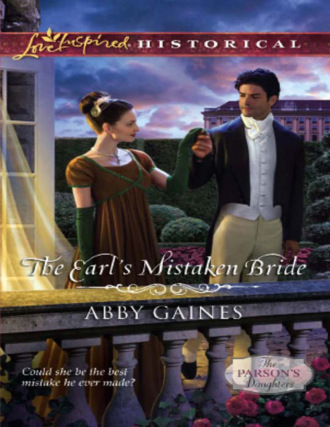
Полная версия
The Earl's Mistaken Bride
His mouth tightened and his voice lowered as he read the shocking account. Afraid of discovery by her father, who had warned that if he heard of Amanda talking inappropriately to any more young men, she would be sent to Miss Petersham’s Seminary—an institution one of Marcus’s cousins attended, it was renowned for its austere discipline—she had supplied Constance’s name in lieu of her own. The moment she heard Marcus had offered for Constance she knew his mistake.
“‘Constance, dear, I could not marry a man so old!’” he read, before he realized where the text was going.
Constance muffled an exclamation, darting an involuntary look at him.
So old? He was in his prime!
Marcus read on.
“‘I do not wish to be a wife without ever having a Season in London. I wish to dance the waltz with handsome young men, to have them pay me compliments… .’”
He’d seen enough. “The girl’s a fool,” he said, as he handed the letter back.
Constance bristled in her sister’s defense. “You didn’t think her foolish when you flirted with her in the village on Monday. With a sixteen-year-old girl barely out of the nursery.”
“I did no such thing,” he retorted. “Your sister was engaged in heated discussion with the squire’s son. I offered my assistance.”
“And when you asked her name, despite having met her on at least twenty occasions, you did not notice her lie.” She sniffed and, thankfully, blinked away those tears that were starting to wear on his conscience. “My father taught me it’s common courtesy to remember the names of those I meet.”
Was she setting her manners above his?
“There are five of you, madam,” he said bitingly. Yet he found he could not meet her gaze, which annoyed him still further.
She pushed the note back into her reticule. “Amanda, you fool,” she murmured, seemingly forgetting she had just castigated Marcus for saying the same. Then she swallowed and that pointy chin went up in the air again.
Marcus braced himself.
“I apologize for suggesting you were insane,” she said, with a graciousness that in a true countess might have been convincing.
Marcus was not convinced. As the coach approached the rectory, he observed the garden had been decorated—bunting strung through the trees.
The wedding feast. Though there would be a private meal indoors, the entire village had doubtless been invited to the public celebration outside.
He’d never felt less like celebrating in his life.
A curricle passed the coach with less than an inch to spare: Severn, tooling his grays like the expert horseman he was. His closest friend had commiserated over the need for Marcus to marry a parson’s daughter, but he had understood entirely.
It would be hard to understand how Marcus had come to marry the wrong girl.
Even harder to explain to the reverend. Impossible to imagine the story wouldn’t spread around the village and thence to London. That Marcus, Earl of Spenford, wouldn’t end up looking a fool.
The carriage turned in through the rectory gates.
“Home!” Constance clasped her hands together, her eyes shining as she peered out.
“Might I remind you,” Marcus said sourly, “this is no longer your home.”
She recoiled. “But…you cannot mean to stay married to me? Not after Amanda’s trick.”
He took grim satisfaction from her shock. “I don’t know if your sister’s letter is true, or whether it’s part of some elaborate deception. Either way, your family has made a fool of me, and that’s something I cannot forgive.”
The carriage jolted over a bump in the driveway; she clutched the door handle.
Marcus pinched the bridge of his nose as he brought himself back to what really mattered. “But my mother is deathly ill. She awaits tidings of my nuptials. I will not disappoint her. We’ll attend the wedding breakfast for a minimum time, then leave for London as planned.”
Constance swallowed. “You mean…an annulment later?”
It irritated him that she asked with such hope. He was the one entitled to hope this was all a nightmare from which he would awaken.
“Since I am not insane,” he said coldly, “and since you are indeed, or were, Miss Constance Somerton and not a fraudster—” and since I have no stomach for telling the world I was duped by a sixteen-year-old chit “—there will be no annulment.”
Chapter Four
The hours spent on the drive to London were the longest of Constance’s life. The coach was comfortable beyond her experience…but she experienced it alone.
Marcus rode with the groom, which she felt certain must provoke speculation in that servant’s mind. What bridegroom didn’t want to spend the hours after his wedding with his new wife?
A bridegroom who’d married the wrong bride.
The man who had so warmly reassured Constance at the church, apologizing for his tardiness, kissing her fingers, had believed he was talking to Amanda.
His shock was understandable, as was his sense of being deceived. Any man who believed himself to be marrying one woman would be…disappointed to find himself bound to another. But Constance was innocent in the matter, as he would surely realize. Sooner or later.
Through the coach window, she eyed his square-set shoulders. He was doubtless thinking on it right now. He was not an unreasonable man.
He is a proud man.
Her mother’s warning came back to her.
Who was Constance to accuse him of excessive pride, when her own pride was smarting? Nor could she condemn his anger, when she was furious with her sister.
They reached a particularly rough patch of road, and Constance braced herself in her corner. It was obvious that due to the dowager countess’s precarious health they were traveling as fast as possible, and no coach could be so comfortable as to remove all discomfort.
By the time they stopped at an inn outside Esher to change horses and to dine, Constance felt as if she might throw up.
The innkeeper’s welcome was hampered by his heavy head cold and accompanying cough, but he ushered them into his best parlor, where the earl asked what she desired to eat.
“Just a little bread,” she said. “Thank you.”
His mouth compressed, but she wasn’t about to explain the combination of exhaustion and nausea that precluded anything more substantial. At least he no longer radiated hostility…although that could be for the benefit of the landlord. She took it as a good sign that he ordered a hearty meal, even though he looked as tired as she felt.
“How much longer is the journey?” she asked, to break the silence left in the wake of the innkeeper’s departure.
“Less than two hours. Mama will be trying to stay awake in the hope of seeing me. Us.”
His mother. The reason for their wedding. The reason he was mistakenly wed to Constance.
“She will be pleased?” Constance asked tentatively.
His lips flattened. “Yes.”
“My lord—” She broke off. “What should I call you?”
“Most people call me Spenford,” he said. “My mother and my cousin Lucinda call me Marcus.”
Not much help. She’d heard that ton couples didn’t necessarily address their spouses by their Christian name.
“You may call me Constance if you wish,” she prompted.
He looked baffled.
She pressed on. “It’s not my fault, sir, that you married the wrong wife.”
“So you claim.”
She ignored that aspersion on her honesty. “My father says—”
“Is your father to be quoted in our every conversation?” he asked.
Her cheeks warmed. “He is the wisest man I know.”
“Nevertheless, I don’t wish to hear his views.”
She clenched her jaw. “Here is my view, then,” she said. “You’re angry, I understand that. I’m angry, too.”
His chin jerked back. “You are angry! What have I done—”
“At my sister,” she snapped. “I’m so angry with Amanda I could—I could slap her.” She realized her voice had risen, her chest was heaving. And her husband was eyeing her quizzically.
“You don’t look the slapping sort,” he said, surprisingly mild. “Have you ever slapped anyone before?”
“Er, no,” she admitted. “But if Amanda were here right now I would do it.” Her sister had wisely not shown her face at the wedding breakfast.
He raised one eyebrow, which even in her ire she could see was a handsome trick. “I don’t believe you,” he taunted.
She puffed out an irritated breath, ready to defend her violent tendencies…and suddenly deflated. He was right. “I don’t suppose you would ever hit a woman?” she asked morosely.
“Of course not!”
She sighed. “There’s not much point wishing Amanda here then, is there.”
One side of his mouth twitched in what might almost have been a smile, except there was nothing to smile about. “I certainly don’t wish she were here,” he said.
For an instant, there was something like camaraderie between them.
Then the landlord entered with their food. He and the maid began to set out dishes. As she sat in the chair the man held out for her, Constance noticed his nose was reddened from his illness. The maid seemed similarly afflicted, making heroic efforts to avoid sniffling.
“You are not well, either of you,” Constance said with concern. “The earl and I can serve ourselves. Please don’t worry.”
The maid dropped a relieved curtsy, but Marcus said, “Your carving skills will be appreciated, landlord.”
Both man and maid stayed several minutes to serve the meal.
Constance had been biting her tongue, but the moment they left, she said, “That was unnecessary. They were both clearly in need of rest.”
“So am I,” he said. “So are you. They should do the job they are paid to do.” He cut into his rib of beef. “I thought parsons’ daughters were supposed to be the forgiving type.”
It took her a moment to realize he was referring to Amanda again.
“Parsons’ daughters aren’t perfect,” Constance said.
He nodded his acceptance of her flaw. But he was right; she would need to forgive Amanda—the little wretch had even asked it of her in that note. I will forgive her. One day.
She nibbled on her bread…and realized her husband had set down his silverware.
“What is it?” she asked, conscious that her blue muslin was rumpled and she’d paid no attention to her hair since he’d torn the bonnet from her head.
“Is this some kind of parsonage austerity diet?” He indicated her bread. “Because I don’t think I can sit opposite you eating dry bread every night—”
“I am travel sick,” she said.
He stood, and moved swiftly to her. “You should have said. Do you have a fever?” His hand moved uncertainly at his side, as if he was considering touching it to her forehead.
For one moment, she craved the comfort of that touch.
“Just a little nausea,” she said. “The bread settles my stomach.”
It was odd to be talking of her physical ailment to a man other than her father. Yet she welcomed the concern that creased his brow.
“You have a strange view of parsonage life,” she observed, as he returned to his seat, “if you think we eat dry bread.”
“I don’t number many daughters of the clergy among my acquaintance.” He resumed eating.
Constance took a sip of water, and licked her lips. “Do you plan to tell anyone what happened today? About the…mistake?”
He didn’t look up. “I have no desire to be the subject of gossip.”
“Nor do I.” She’d been overlooked her whole life; to come to the world’s attention in the worst possible way would be too cruel.
Now he did meet her gaze. He wiped his mouth with a napkin, drawing her attention to the lips that had kissed her hand. “No one anticipates an emotional attachment between us,” he said. “Mutual respect is what they expect to see. What they should see.”
It sounded cold to Constance, when she thought of her parents’ loving marriage. But much better than humiliation.
“I am most willing to show respect to you,” she said.
He gave a little jolt, as if he’d taken that for granted. “And I you,” he replied.
It seemed they had reached a kind of truce.
It also seemed he didn’t feel compelled to say more.
They finished their meal, and then it was back to the solitude of the coach.
It was nine o’clock when they drew up outside a fine town house in Mayfair’s Berkeley Square.
By the time Constance alighted with the assistance of the groom, the front door stood open. Marcus offered his arm, then escorted her up the steps, into an entrance hall where an array of servants lined up to greet them.
“Dallow,” he said to the butler, “may I present the Countess of Spenford.” No affection in his tone, of course, but the respect he’d promised.
“Your ladyship.” The butler bowed low to Constance. Her own family had servants—a cook, two maids, a manservant and an occasional gardener. But none so grand as this personage.
Dallow introduced her to the rest of the servants. She managed to say a word or two to each, smiling at a young lad who barely stifled a yawn. She suspected they were all as tired as she, having been preparing the house for a new mistress.
“How is my mother?” Marcus asked the butler.
“I believe Lady Spenford is awake and anxious to see your lordship. And your ladyship.”
Constance sensed Marcus was forcing himself to slow to a genteel pace as he escorted her up the imposing staircase. He knocked on the door of the dowager countess’s room. It was opened by a middle-aged maidservant.
She curtsied. “My lord.”
“Good evening, Powell. May I present the Countess of Spenford?”
Powell curtsied to Constance, the frankness of her appraising gaze suggesting a servant of long standing.
“Is my mother awake?” the earl asked.
“Is that you, Marcus?” a voice called.
His face lit. “She sounds stronger.”
They passed through a small but charming sitting room to reach the dowager’s bedroom. She sat in bed, propped against an enormous number of pillows. Her wrapper and cap were the most fetching Constance had seen.
“Oh!” Helen, Lady Spenford, pressed her hands to her cheeks. “Constance, my dear, it’s really true! You married Marcus!”
“Yes, my lady.” Constance approached quickly, and dropped into a curtsy.
The dowager laughed as she grasped Constance’s hand. “I half thought I must have dreamed Marcus telling me on Tuesday you’d agreed to be his wife. And now here you are!”
“Mama, it’s wonderful to see you looking so well.” Marcus leaned down to kiss her cheek.
“I do feel better,” the dowager admitted, on a note of revelation. “Your happy news must have boosted me. I’ve always been fond—extremely fond!—of you, Constance, and now you’re my daughter.”
“Thank you, ma’am.” Her effusiveness was embarrassing, but Constance basked in its warmth. “Is there anything I can do for you?”
The dowager smiled. “Two things, my dear. Call me Mama, and accept my warmest welcome into our family. Marcus, I’m persuaded a wife as gentle and sweet as Constance will soon be dear to your heart.”
Marcus made a noncommittal sound.
Given that he’d taken a fancy to Amanda, Constance suspected sweet and gentle sat low on his list of desirable wifely qualities. As for his heart…
The dowager patted Constance’s hand. “Of course, you never had any thought of marrying my son—” Constance blushed “—so this has been very sudden. I hope you are happy?”
She’d just endured the most miserable few hours of her twenty years.
“Mother,” Marcus protested, “it’s late, and Constance has had a long journey.”
It was the first time he’d spoken her name since the wedding. Even after all that had happened, she liked hearing it on his lips.
Foolish.
“My—Mama, I agreed to marry the earl of my own free will,” she said. “We made our vows before God. So I’m certain I will be happy.” She wouldn’t lie and say she was happy now. But she had faith for the future.
The dowager directed a questioning glance at her son.
His hand settled on Constance’s shoulder. “I share my wife’s certainty,” he said.
Really? He felt they could overcome this awkward beginning, too? They had no choice, of course, but still…Constance hadn’t hoped for a softening this soon. She was suddenly aware of his thumb, aligned with the edge of the dress where it met her shoulder.
“That’s all I could want.” Helen pushed herself higher against the pillows. “I declare, I haven’t felt so lively in months.”
“I hope you’ll be still livelier tomorrow,” Marcus said fondly. “But Mr. Bird would be alarmed to see you overexerting yourself. He would worry you’ll weaken your heart further.”
His mother sighed. “Constance, dear, you never met such a man as my doctor for depressing one’s hopes of recovery! He can be quite an old woman.”
“That ‘old woman’ is the finest doctor in London,” Marcus said.
“I know, darling, and he’s so worthy.” The dowager pulled a face. “But when I think how I never used to go to bed before midnight…”
“Maybe those days will come again,” Marcus said gently, “but not, I suspect, today.”
“You’re right. I should sleep. Constance, will you come to me tomorrow?”
“I’ll spend the day with you, Mama—” she shot a glance at Marcus “—that is, if Lord Spenford doesn’t have other plans.”
His look, full of approval, warmed her through. “Certainly you could spend much of the day here.”
“The morning only,” the dowager corrected. “Constance mustn’t stay cooped up in a sickroom, when she has a new home and a new husband to enjoy. Good night, my dears.”
Back out in the hallway, Marcus waited until the maid, Powell, had closed his mother’s door. “Thank you for offering to spend time with Mama,” he said. “I appreciate your willingness to do your duty after today’s…difficulties.” It was an odd speech, spoken stiffly but with an underlying vulnerability that touched Constance’s heart.
“Sitting with your mother will be a pleasure, not a duty,” she said. “I’ve always been fond of her.” Would he think that impertinent, a parson’s daughter holding fondness for a countess?
His eyes searched her face, which she knew to be wan and drawn. This was the closest she had been to him since they’d exchanged their vows. She tried not to look at his lips, not to wonder if they would feel the same against her mouth as they had against her fingers.
“It’s late. You should go to your chamber,” he said.
“Yes.” Bed sounded wonderful…or did it? The realization that this was her wedding night hit her. Is he sending me to my chamber because he wants…
Perspiration broke out on her forehead—should she pull out a handkerchief, or hope he didn’t notice?
“Are you all right?” he asked, frowning.
“I don’t know where, er, my chamber…”
His face cleared. “The other side of the landing. First door on the left.”
“You must be tired, too,” she suggested.
“I have a few letters I must read tonight. I’ll retire soon.”
Unfortunately, he omitted to mention which room he planned to retire to.
Chapter Five
A footman conducted Constance to the countess’s bedchamber. Her bedchamber.
A young woman dressed in a plain dark dress was waiting. She curtsied. “Good evening, my lady. I am Miriam Bligh, your maid.”
“Oh,” Constance said, surprised. She’d known she would end up with such a servant, but not so soon.
“I was a senior housemaid at Chalmers—the main Spenford estate,” Miriam clarified, assessing Constance’s blank look, “but I’m used to acting as lady’s maid for guests.” She rubbed her palms down her skirt. “But if your ladyship would prefer to hire her own maid…”
Constance had no idea what she preferred. But Miriam’s pleasant face and tall, angular shape were practical and oddly reassuring. “Thank you, Miriam, I’m sure you will serve. Er, I suppose I should call you Bligh.” Being addressed by her surname was a sign of superior status, just as it was for a valet.
Another curtsy, this one more a bob. “Yes, my lady, though I daresay I’ll answer to either. If you’re ready to retire, I’ll assist you in undressing.”
Constance had undressed herself, unassisted but for the occasional help of one of her sisters, for as long as she could remember. But she wouldn’t argue. Papa always said one should understand something before one sought to change it.
Did the same rule apply to husbands?
As Miriam unhooked her dress, Constance surveyed the room. The rose brocade canopy over the high bed matched the elegant curtains at the window. In addition to the dressing table with its padded stool, there was a French-style writing desk with matching chair. The carpet was woven in a floral pattern of faded reds and greens. Even in the candlelight, it was clear everything was of the finest quality.
“I took the liberty of arranging your clothing in the press, my lady,” Miriam said.
That wouldn’t have taken long.
“And I have laid out your nightdress,” the maid continued.
Constance glanced involuntarily toward the bed. The one new item in her trunk had been this nightdress of finest lawn, sewn by her mother and sisters over the past few days.
“Madame Louvier will visit tomorrow morning,” the girl continued. Correctly interpreting Constance’s murmur as one of ignorance, she added, “Madame is the best modiste in London.”
Constance would ordinarily be delighted at the thought of new dresses. But her immediate thought was that Amanda would be even more delighted, and the recollection of her sister brought a welling of sharp anger. She clenched her hands into fists.
“My lady?” Miriam held up the nightdress.
“I—yes—” she shook her fingers loose “—thank you.”
When she was attired for bed, Miriam brushed out her hair.
“My lady has thick hair,” she approved.
“The color is unremarkable,” Constance pointed out.
She was pleased the maid didn’t lie to flatter her, merely contented herself with, “The sheen is attractive.”
Certainly under Miriam’s vigorous brushing it did have more sheen than usual. In her beautiful new nightdress, her hair smooth and gleaming, Constance felt more a bride than she had during the wedding ceremony. This is my wedding night.
“If you need me, my lady, you have only to ring.” Miriam indicated the bellpull.
“The, er, the earl’s chamber?” Constance asked, as she climbed onto the bed.
“Through there.” Miriam indicated a doorway to Constance’s left. “Good night, my lady.”
Constance lay in bed, blankets pulled up to her chin, observing the shadows that flickered on the wall.
Her wedding night. She’d thought of this moment in the past few days…what bride wouldn’t? Curiosity, anticipation and—thanks to her mother’s scrambled words on the subject of wifely duty—some trepidation had mingled within her.
When her husband came to her, she would be a wife in deed as well as in name.
Would he come to her tonight? He had been angry. With good reason.
She didn’t want him to come to her in anger.
But they had struck a moment of accord during dinner, and he’d assured his mother he intended to be happy. If his anger had cooled, if he wanted to further his intimacy with the woman he had married…
He had thought he was marrying Amanda.
But he didn’t love Amanda, Constance was certain. So although he might have wished for a prettier wife, he had no sentimental attachment to her sister.
If he came, he would forge a bond intended by God to unite man and wife.
Probably, he would not come.
But perhaps he would.
If Amanda was to be believed—she knew far more about it than any young lady ought—even the highest-ranked gentlemen looked forward to their wedding night with eagerness.










